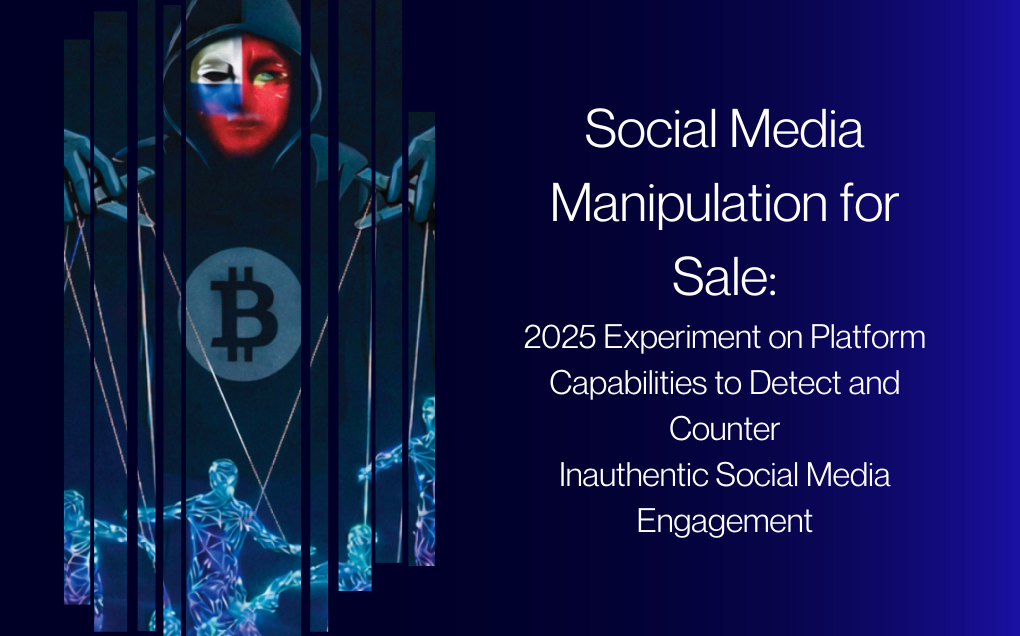Introduction
Around the turn of the decade, when the popularity of social media sites was really beginning to take off, few people noticed a secretly burgeoning trend — some users were artificially inflating the number of followers they had on social media to reap financial benefits. Even fewer noticed that organisations such as the Internet Research Agency were exploiting these new techniques for political gain. Only when this innovation in information warfare was deployed against Ukraine in 2014 did the world finally become aware of a practice that has now exploded into federal indictments,1 congressional hearings,2 and a European Union Code of Practice on Disinformation.3
At the heart of this practice, weaponised by states and opportunists alike, is a flourishing black market where buyers and sellers meet to trade in clicks, likes, and shares. NATO Strategic Communications Centre of Excellence in Latvia and the Ukrainian Social Media analytics company Singularex have undertaken a joint venture to map the online market for social media manipulation tools and services. We have scanned the dark web and tracked down sellers, buyers, and victims in an attempt to understand what a potential customer, wishing to wage information warfare, can purchase online.
The black market services are unregulated, unreliable, and come with a number of disadvantages:
- Technical risks — social networks monitor and block users who circumvent their terms of service.
- Reputational risks — reputable companies or influencers risk ruining their reputations if they are discovered using black market manipulation tools.
- High risk interactions with suppliers — as the supply side operates in a grey zone, some sellers extort their customers and many of the advertised services are fraudulent.
- Unsustainable — although there are a number of short-term benefits, an artificially inflated business model is unsustainable in the long run.
Although there are a number of disadvantages to using black-market tools, the advantages are clearly attractive given the availability of services.
- Easy to avoid detection — although social media companies work to reduce inauthentic activity on their platforms, they are not keeping pace with the technological advancements of the black market suppliers, which means that it still easy to avoid detection by both social media companies and the public.7
- Simple product — the products are easy to understand and market, and have a simple pricing structure.
- Multiple choices — customers have a wide range of choices, and suppliers are constantly developing new products.
- Large potential reward — successful social media manipulation can result in substantial short-term financial and political rewards.
Conclusions
There is a large, vibrant online market for buyers and sellers of tools and services for social media manipulation. Some customers want more likes on their photos, some want to profit financially at the expense of the ad industry, and others want to influence the outcome of elections. Regardless of the end goal, the tools used are much the same.
Social media manipulation is undermining democracy, but it is also slowly undermining the social media business model. During the past year, the social media giants have committed to better protect their platforms. Anecdotal evidence suggests this has led to an increase in the cost of manipulation tools and services. Despite the commitments of online platforms and leading social networks, codified in the EU Code of Practice on Disinformation, this study shows it is still surprisingly cheap and easy to manipulate social media.
Our research resulted in four surprising conclusions.
- First, we were impressed by the scale of the black-market infrastructure for developing and maintaining social metric manipulation software, generating fictitious accounts, and providing mobile proxies and solutions for SMS activation.
- Second, we were struck by the openness of this industry. This is no shadowy underworld, it’s an open and accessible marketplace most users can find with little effort through any search engine.
- Third, we were surprised to find service providers advertising on Google and Bing. Providers trafficking in YouTube manipulation services buy ads from Google—the owner of YouTube—and fearlessly promote their services in public.
- Lastly, we were intrigued to learn that Russian service providers seem to dominate the social media manipulation market. Virtually all of the major software and infrastructure providers we were able to identify were of Russian origin.
The dark web—it turns out—is the least of our worries.






